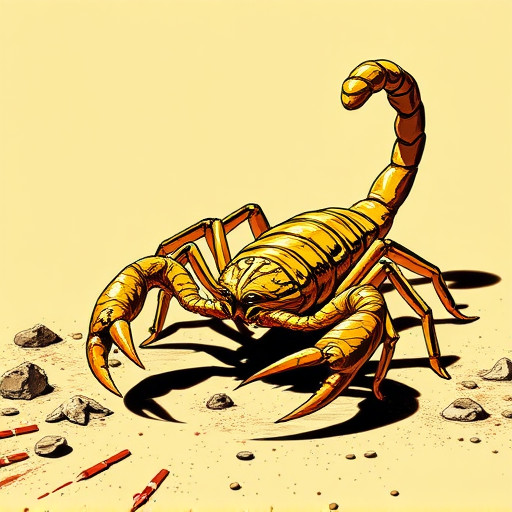Scorpion stings can be dangerous, causing local and systemic reactions. Prompt recognition of early signs is crucial for effective scorpion control. Swift action is key—keep calm, loosen jewelry, wash the area, apply cold compresses, take pain relievers, and seek medical help for severe symptoms like difficulty breathing or rapid heart rate. Home remedies are often effective, but severe reactions require immediate medical attention. To avoid stings, maintain a clean home, seal entry points, and use specialized scorpion control services.
“Scorpion stings can range from painful to life-threatening, making it crucial to understand these encounters. This article provides a comprehensive guide to navigating scorpion stings safely. We’ll explore the causes and symptoms of these encounters, offering immediate actions for relief and detailing effective first aid treatments at home. Additionally, we’ll discuss when medical attention is necessary and provide preventive measures for scorpion control, ensuring you’re equipped to handle these situations responsibly.”
- Understanding Scorpion Stings: Causes and Symptoms
- Immediate Actions After a Scorpion Sting
- Home Remedies and First Aid Treatments
- When to Seek Medical Attention and Preventive Measures for Scorpion Control
Understanding Scorpion Stings: Causes and Symptoms

Scorpion stings can be a serious matter, especially for those living in regions where scorpions are prevalent. Understanding what causes them and recognizing the symptoms is the first step in effective scorpion control. When a scorpion stings, it injects venom through its sharp, barbed tail into the skin of its victim. This venom contains a mix of chemicals that can cause local and systemic reactions.
Symptoms typically include immediate pain at the site of the sting, often described as intense or burning. Swelling, redness, and warmth may also develop in the affected area. In some cases, more severe symptoms like nausea, vomiting, dizziness, and difficulty breathing can occur, especially if an allergistic reaction is involved. Recognizing these early signs is crucial for prompt treatment to prevent potential complications from scorpion control measures.
Immediate Actions After a Scorpion Sting

If stung by a scorpion, immediate action is crucial for effective treatment and mitigating potential risks. The first step is to stay calm and avoid panicking, as this can lead to rapid muscle contractions that could spread the venom faster. Remove any jewelry or tight clothing near the sting site, as these can restrict circulation and cause more localized swelling.
Next, thoroughly wash the affected area with soap and warm water to reduce the risk of infection. Applying a cold compress or ice pack wrapped in a thin cloth can help relieve pain and reduce inflammation. For severe pain or significant swelling, consider taking over-the-counter pain medication like ibuprofen or acetaminophen, but avoid aspirin as it may increase bleeding risk. If you suspect a severe reaction, such as difficulty breathing, dizziness, nausea, or rapid heart rate, seek medical attention immediately, as these could be signs of a more serious reaction that requires professional scorpion control measures.
Home Remedies and First Aid Treatments

When dealing with a scorpion sting, it’s important to know that while some stings may cause severe pain and discomfort, many cases can be treated at home using simple remedies and first aid. Initially, wash the affected area thoroughly with soap and water to reduce the risk of infection. Applying ice packs or cold compresses for 10-15 minutes several times a day can help alleviate pain and swelling.
Additionally, over-the-counter pain relievers like ibuprofen or acetaminophen can manage discomfort and reduce inflammation. In most instances, natural home remedies such as applying apple cider vinegar or baking soda paste to the sting site can neutralise the venom’s effects. However, for more severe reactions, or if stung in sensitive areas like the face, neck, or groin, seeking immediate medical attention is crucial. Remember, proper scorpion control measures at home can significantly aid in managing stings effectively without professional intervention.
When to Seek Medical Attention and Preventive Measures for Scorpion Control

If you or someone else experiences severe symptoms after a scorpion sting, such as difficulty breathing, extreme pain, nausea, or swelling in the face or throat, immediate medical attention is crucial. These could be signs of a life-threatening reaction, and professional care can help prevent potential complications.
To avoid scorpion stings altogether, preventive measures are key. Keeping your home and surroundings clean, sealing entry points, and using pest control services specializing in scorpion control can significantly reduce the risk. Regular inspections and proper storage of outdoor items also help create a less hospitable environment for these creatures, thereby minimizing exposure for you and your family.
Scorpion stings can be painful and potentially dangerous, but with prompt action and proper first aid, most people can recover safely. Understanding the cause and symptoms is key, as is knowing what immediate steps to take after a sting. Home remedies and first aid treatments can help alleviate pain and reduce inflammation, while seeking medical attention is crucial for severe reactions or persistent symptoms. Additionally, implementing effective scorpion control measures can prevent future encounters, making it essential to take proactive steps in environments where scorpions are prevalent.
